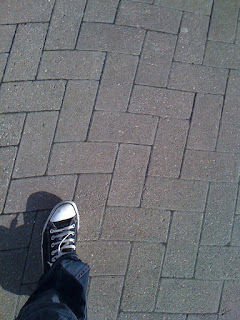So I decided to skip the ‘10 Things that will change your life in 2011’ or my ‘10 Social Media Trends That Will Make You Instantly Attractive’ posts for something different at the end of 2010: my passion for coffee.
Coffee has become such an important part of my work life - it's a daily ritual. Having a somewhat nomadic work life and a bunch of demanding projects I rely upon a change of scenery to come up with ideas or solve business challenges. So the daily espresso and where I consume it has become just as important in my work life as the co-worker or office space might be to you. My Twitter followers will know I’m often tweeting about my latest coffee and one of them - @Stefidi - asked me to blog about my top
#1Market Coffee House, E1: What I like about this place is that it’s 'old school'. Avoid peak times and you can find a quiet spot to sit and read the paper (at busy times, you'll be asked to put your laptop away). They usually have Radio Four on, and even if you can’t hear it properly above the din of the coffeeshop, it sets a nice vibe, an old-fashioned contrast to the suits and the glossy office blocks of the City across the street.
 #2 Nude Espresso, E1: I discovered Nude Espresso when an ex-client who was working at Habitat took me there a few years ago. It tends to be frequented by creatives and local agency types but has a nice vibe. It’s a good meeting and thinking place. I like their tiered tipping system.
#2 Nude Espresso, E1: I discovered Nude Espresso when an ex-client who was working at Habitat took me there a few years ago. It tends to be frequented by creatives and local agency types but has a nice vibe. It’s a good meeting and thinking place. I like their tiered tipping system.#3 The Luxe, E1: The Luxe often becomes my East London workspace. The coffee is good, the staff friendly and I feel I could stay all day. If you’re looking for a quiet space to get your head down then this place is not for you; but if you’re after a stimulating environment, some people watching and a comfy sofa then this is your place. On most mornings you can work to an 80s, 90s soundtrack (they like their music loud here) and you can often spot locals like Gilbert and George here.
#4 Monmouth Coffee Company, WC2: If I had to rank these venues in order of quality and service, Monmouth would win (hey, I even wrote a post about it for BNET.com). The coffee, the price, the service is all good. This tends to be a pit-stop for me rather than somewhere I hang out and I drink espresso as it was intended - quickly. You can sit on the bench outside and people watch. The coffee here even attracts visitors staying at The Covent Garden Hotel across the street; I once spotted Jack Black in the queue behind me. When I take guests or friends here for the first time what they like most is the simple but effective ordering system. Once you request your coffee, the cashier shouts up to the barista on the mezzanine behind you, ‘single espresso'. the barista shouts back ‘single espresso’ to confirm they heard. How’s that for a damn simple system?
#5 Monmouth Coffee Company, SE1: Here at their Borough Market shop I tend to linger longer, they have a communal table, a small bar to sit up at and a tiny mezzanine which is great for people watching. I spent a great Saturday here once editing my second book. This is the view from that spot onto the market.
#6 Flat White, W1: In the bustle of
#8 Bar Italia, W1: This list would feel incomplete without Bar Italia. To be honest, I don’t rate the coffee much but it remains a

#9 Rough Trade East, E1: If you like your vinyl or browsing CDs it doesn’t get much better than Rough Trade’s shop at the Truman Brewery. And there’s a little coffee shop by the entrance for people watching, writing in the moleskine after being inspired by all that music.
#10 Albion Cafe at The Boundary Hotel, E2. This tends to be a morning spring or summer hang out for me, sitting outside and having a few coffees or a late brunch. Down a blink-and-you’ll-miss-it alleyway from Shoreditch High St
Notes: i) I haven’t included any chain coffee shops because I try and avoid them; ii) I haven’t included member’s clubs as that’s elitist; iii) all photos by Ian Sanders.
Notes: i) I haven’t included any chain coffee shops because I try and avoid them; ii) I haven’t included member’s clubs as that’s elitist; iii) all photos by Ian Sanders.
























